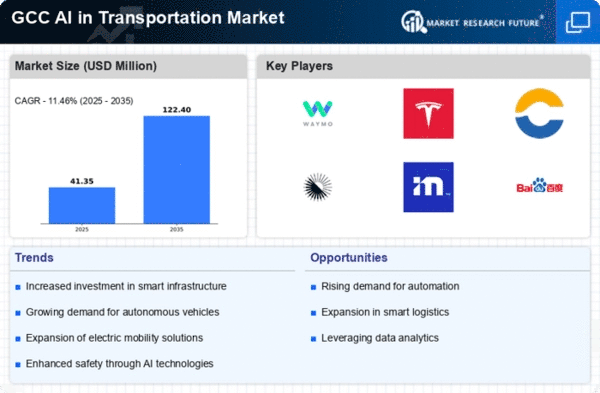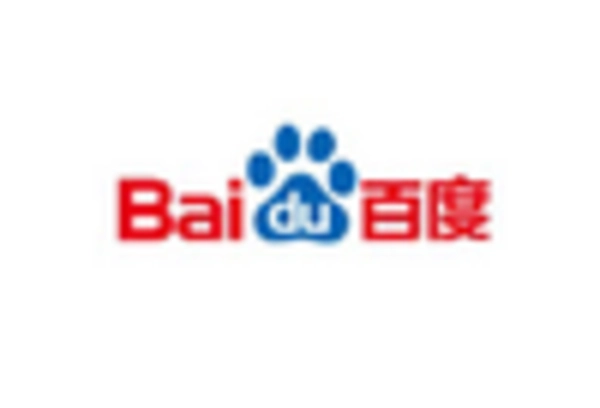Technological Advancements in AI
Rapid technological advancements in AI are significantly influencing the ai in-transportation market within the GCC. Innovations in machine learning, computer vision, and data analytics are enabling the development of sophisticated transportation solutions. For example, AI algorithms are being utilized to optimize traffic flow and enhance route planning, which can lead to a reduction in travel time by up to 30%. Additionally, the integration of AI with IoT devices is facilitating real-time data collection and analysis, further improving operational efficiency. As these technologies continue to evolve, they are expected to play a crucial role in shaping the future of transportation in the region.
Government Initiatives and Support
The ai in-transportation market in the GCC is experiencing a surge in government initiatives aimed at enhancing transportation systems. Various GCC nations are investing heavily in smart city projects, which integrate AI technologies into public transport. For instance, the UAE has allocated approximately $1.5 billion for smart transportation solutions, indicating a strong commitment to modernizing infrastructure. These initiatives not only improve efficiency but also aim to reduce traffic congestion and enhance safety. Furthermore, government support in the form of subsidies and grants for AI startups in transportation is likely to foster innovation and attract investment, thereby propelling the market forward.
Increased Investment from Private Sector
The ai in-transportation market is witnessing a notable increase in investment from the private sector, which is crucial for its growth in the GCC. Venture capital firms and technology companies are channeling funds into AI startups focused on transportation solutions. Reports indicate that private investments in this sector have surged by over 40% in the past year, reflecting a growing confidence in the market's potential. This influx of capital is expected to accelerate the development of innovative AI applications, such as autonomous vehicles and smart traffic management systems, thereby enhancing the overall transportation landscape in the region.
Rising Demand for Enhanced Safety Features
Safety concerns are becoming a primary driver in the ai in-transportation market across the GCC. As road traffic accidents remain a significant issue, the integration of AI technologies is seen as a potential solution to enhance safety. AI systems can analyze vast amounts of data to identify hazardous conditions and predict potential accidents, thereby improving response times. Moreover, the implementation of AI in vehicle safety features, such as automatic braking and collision avoidance systems, is likely to gain traction. This focus on safety not only addresses public concerns but also aligns with regulatory requirements aimed at reducing road fatalities.
Growing Urbanization and Population Density
The increasing urbanization and population density in GCC cities are driving demand for advanced transportation solutions, thereby impacting the ai in-transportation market. With urban populations projected to rise by over 20% in the next decade, the need for efficient public transport systems becomes paramount. AI technologies are being leveraged to develop smart public transport systems that can accommodate this growth. For instance, AI-driven predictive analytics can help in demand forecasting, ensuring that transportation services are aligned with population needs. This trend indicates a shift towards more sustainable and efficient urban mobility solutions.
















